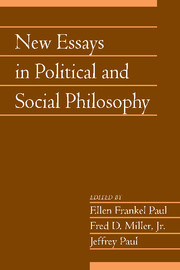Book contents
- Frontmatter
- Contents
- Introduction
- Acknowledgments
- Contributors
- Political Liberty: Who Needs It?
- State Coercion and Force
- Political Legitimacy and Economic Liberty
- Who Owns What? Some Reflections on the Foundation of Political Philosophy
- Human Reproductive Interests: Puzzles at the Periphery of the Property Paradigm
- Why Free Trade is Required by Justice
- Structural Exploitation
- Rescuing Justice from Equality
- Reinterpreting Rawls's The Law of Peoples
- Responsible Choices, Desert-Based Legal Institutions, and the Challenges of Contemporary Neuroscience
- Genocide and Crimes Against Humanity: Dispelling Some of the Conceptual Fog
- Harm and the Volenti Principle
- Education and the Modern State
- Index
Reinterpreting Rawls's The Law of Peoples
- Frontmatter
- Contents
- Introduction
- Acknowledgments
- Contributors
- Political Liberty: Who Needs It?
- State Coercion and Force
- Political Legitimacy and Economic Liberty
- Who Owns What? Some Reflections on the Foundation of Political Philosophy
- Human Reproductive Interests: Puzzles at the Periphery of the Property Paradigm
- Why Free Trade is Required by Justice
- Structural Exploitation
- Rescuing Justice from Equality
- Reinterpreting Rawls's The Law of Peoples
- Responsible Choices, Desert-Based Legal Institutions, and the Challenges of Contemporary Neuroscience
- Genocide and Crimes Against Humanity: Dispelling Some of the Conceptual Fog
- Harm and the Volenti Principle
- Education and the Modern State
- Index
Summary
No political theorist of the twentieth century has been more celebrated than John Rawls, and none has been more frequently misinterpreted. A Theory of Justice (TJ) was routinely misunderstood because readers were unprepared for the breathtakingly original types of arguments therein. Political Liberalism (PL) was systematically misjudged because many of us did not understand that it was concerned principally with legitimacy rather than justice. In this essay, I suggest that many commentators may have also misinterpreted John Rawls's project in The Law of Peoples (LP). In particular, I raise the possibility that many of the standard criticisms of this work miss their mark by presuming that Rawls sought to offer a comprehensive theory of global justice, when he meant more minimally to respond to a specific, practical problem: “How can we eliminate the great evils of human history?”
I divide this essay into three sections. First, I offer a very brief summary of The Law of Peoples. In the second section, I survey a number of criticisms that have been raised against Rawls's arguments and the conclusions he draws from them. Finally, I suggest an alternative interpretation of LP, one that both squares with Rawls's own description of his project and enables the rebuttal of the standard objections to this work.
- Type
- Chapter
- Information
- New Essays in Political and Social Philosophy , pp. 213 - 232Publisher: Cambridge University PressPrint publication year: 2013

